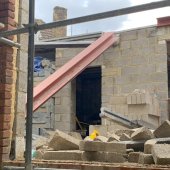Accountability Across the Built Environment
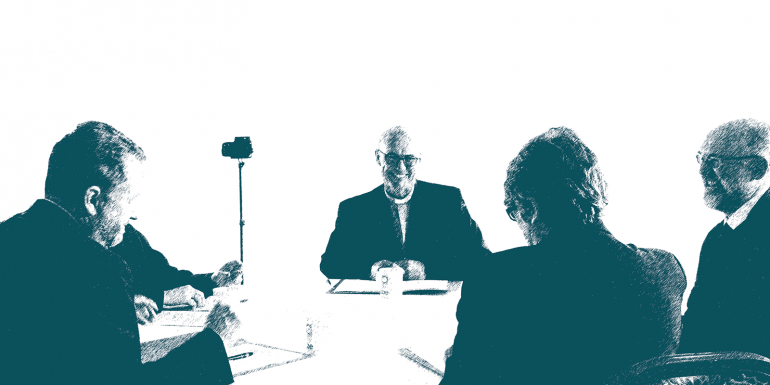
In the absence of this year’s Gala Dinner to announce the Built Environment Awards, CABE held a Round Table to discuss the important issues facing the industry and drew attention to the Award winners. Dr Gavin Dunn C.BUILD E FCABE chairs: Richard Harral C.BUILD E FCABE, Jayne Hall PCABE C.BUILD E FCABE, Rev Kevin Fear HON FCABE and Liz Male MBE.
The culture of the construction industry is changing. What are the most important adjustments that we need to see happen?
Jayne: Most importantly we need to demonstrate that we are competent, that we are professional and can do our job. Along with this we have to have the correct ethics, we have to be looking to build the best buildings possible and regain the confidence of the public. It is critical to prove to those questioning us that we can do our job.
Kevin: I think culture change is needed to give a better picture to the public, and to look after our own people. We have focused a lot on safety issues, occupation health and the need to focus on mental health. Looking after our people and treating them properly, it is shocking that around 30% of our sites still do not have basic welfare – cultural change is desperately needed.
Is the construction industry still an attractive career path to follow?
Richard: It should be because the act of creating these assets is tremendously satisfying. It is a fantastic thing as a designer to see what you imagined being brought into reality. In any part of the construction sector, there’s a tangible output at the end of the day. It’s different to a lot of jobs.
I’m a great believer in civilise the environment civilise the person. If we want people to really look at construction as a viable career path, we need to understand that we have to create good conditions for them to work in. Too often, the behaviour sets of people in the industry are a reflection of them not feeling that they have much respect or self-worth. If we create a good environment to work in, better organised, better welfare facilities, more compassionate care and flexibility, we’re going to get better outputs from the sector. We’re also going to be able to recruit much more effectively.

CABE President Jayne Hall PCABE C.Build E FCABE is the Built Environment Enforcement Officer at South Gloucestershire Council
Liz: Communication is essential to this. We need to find a way of recognising, rewarding and celebrating what good work looks like. And get everybody used to the idea of what good work looks like. I think everyone in the construction ecosystem can take the opportunity to celebrate the changes and the innovations and better working practices, and share learning with the whole industry.
How do you think the golden thread will work in practical terms, in the way individuals communicate and behave?
Liz: The golden thread, this idea of being able to track everything and pinpoint accountability, is the right thing to do. But I do think we must be careful not to rely on – be it BIM or some other technology system – and assume that the golden thread is ticked and that we’ve done our communicating, sharing and accountability. It goes to a much deeper level in the way that we operate, perform and collaborate as teams.
In practical tearms, what does it mean for the behaviour of people on sites themselves?
Kevin: I’m going to use a word that is probably unfamiliar in construction, but it’s kindness. It’s about treating each other as you would expect to be treated yourself. And that can be challenging because we are also bound by contract, demands on us, the exchange of risk and money, and that can drive behaviours.
Jayne: That has been apparent from the whole terrible Grenfell disaster. I think everybody’s aware of the cowboy builder culture. It’s very important for leadership
to set the bar as high as you feasibly can and make sure that people aspire to
do the best. Yes, money is obviously a factor; but there are things we must not compromise on.
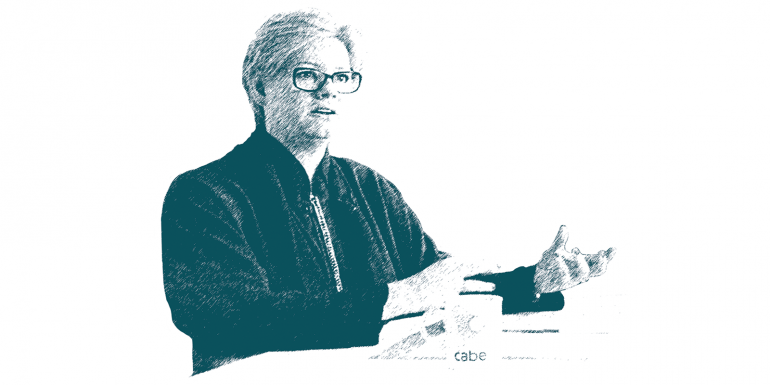
Liz Male MBE is MD of Liz Male Consulting, a PR and communications company for the construction sector
We’re at the start of a new building regulatory process here in England and across the UK. Do you think it’s going too far?
Richard: We’ve got to understand the extent to which there has been a loss of trust in the capability and safety of the sector at a political level and among the public. The sanctions reflect the level of anxiety. The industry has also been shown to be very fragmented, very siloed, with a lack of personal responsibility throughout the supply chain.
Too many people are expecting someone else to make the decisions that matter. So I would say that the sanctioning regimes that have been introduced are pretty much proportionate to the risk that the industry presents to people when it does things wrong. Unless the incentives are there, particularly in the way that work is commissioned and managed, we won’t get change.
Liz: Richard just touched on this critical issue of trust and what it is that creates public trust. There was some really interesting research on this done by Ipsos MORI. One of the key criteria for building, or rebuilding, public trust was consistency in terms of behaviour, processes, what people could expect and the outcome. Ombudsman schemes such as Trustmark, other accreditation schemes and consumer redress schemes are important, but they’re sort of too late. The trust comes much earlier on and it comes from consistent, good behaviour made visible as an industry norm.
What are the moral and wellbeing implications to the broader society of the breakdown of trust?
Kevin: Building tragedies occur infrequently, so when something like Grenfell happens it feels like a big rock is dropped into the pool and it takes a long time for the surface to become still again. I think we need to start with trust within the industry; people not paying when they should, people perhaps hiding things within the original tendering process. We need to build trust within the industry before the public will trust us.
Gavin: I guess at the end of the process there needs to also be a new approach and a new behaviour set from regulators themselves to back that up to create accountability. Jayne, you’re currently enforcement manager for a local authority? How do you think this will play out? What will the new normal be for regulatory enforcement in our sector?
Jayne: I think the sanctions that are going to be introduced are nothing more than what the public thinks that we are already doing. And they’ll be disappointed to find out that we don’t have stop notices, we can’t take real action against companies flouting regulations.
As Kevin said, you need some consistency to regain that respect for the standards from everybody involved in the industry; for the developers, the people who are putting money in, the designers, the contractors, the subcontractors and the craftsman. Everybody needs to respect that the standards are there for a reason. Not to try to evade them or to or to work around them, but to be honest and open and accountable for applying those standards.
Accessibility, for example. If every building was designed to be accessible to all, we wouldn’t have any problems. It’s about being able to look at a much bigger picture and deliver a product that is wholly acceptable to the end user of that building. It shouldn’t have taken a tragedy to bring it to the fore. Consumers have more rights buying a kettle from Argos than in purchasing a building. If we can tighten up our approach to building control we can move forward.
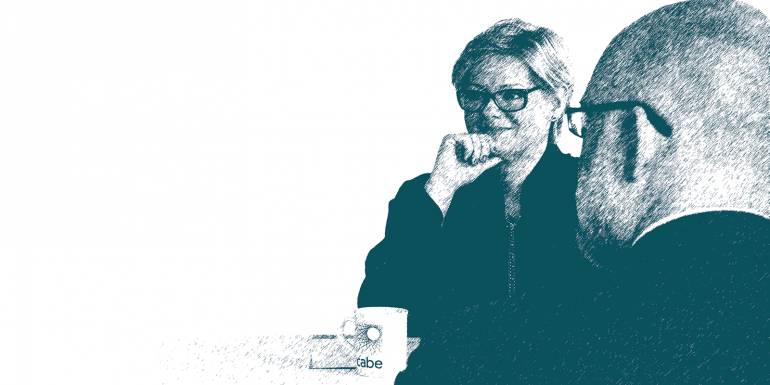
It’s quite right that life safety matters are front and centre, but what about other challenges for example climate change or quality?
Richard: The industry has a huge quality management problem, which links to macro-level issues in procurement. We just aren’t in the right space to ensure that what’s designed is delivered. We’re not getting the performance we want out of buildings, and that’s got to change.
The complexity of what we’re building to deal with climate change is much greater than the building work we’ve done historically, and if you get it wrong it has long-term implications, whether that’s ventilation or overheating. There is a whole range of factors that are going to be far more important. We need a regulatory regime that helps drive towards that.
If you look at the proposals around gateways and around change management, what you’re starting to see are regulatory backstops that could underpin much better quality management. Everyone is going to have to get used to the idea that if they can’t convince the building safety regulator that they’ve done things properly, they’re not going to progress. That’s a big change.
Liz: [This new regulator will also be thinking about control of existing high-risk buildings, potentially built many years ago to a myriad of standards] when I look at the retrofit sector or refurbishment sector, I see that as one of the most exciting opportunities in the construction industry.
I think we will find that people get much better used to this idea of building in a more consistent, more predictable way, better quality outcomes through an approved process. We’ve obviously got fantastic standards in place including installers and trades now requiring Trustmark accreditation for retrofit work under the Green Homes Grant and this will definitely push us in the right direction.
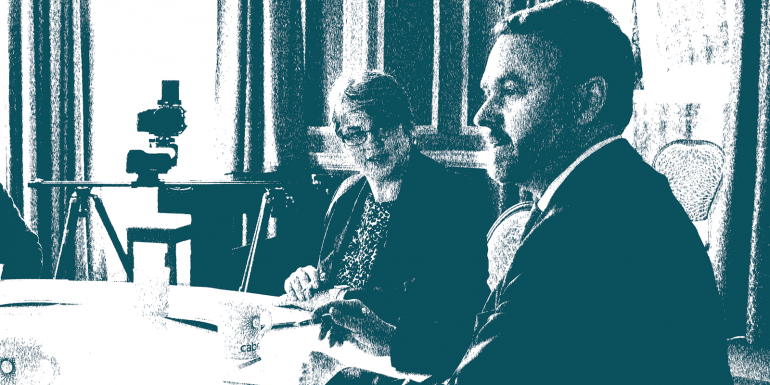
Dr Gavin Dunn C.Build E FCABE and CEO of CABE chairs the discussion
How can we manage procurement, which is key to unlocking so many key issues within the built environment, climate change, health, safety, skills and education?
Liz: Procurement is where all the power lies; the buyer can set the standards.
And this is an opportunity, as you say, to address such a wide range of issues, obviously safety and sustainability, but also diversity and social value. Regeneration, the levelling up agenda.
The question in my mind is, will clients do that? Will they procure for best value, will they procure for the best possible outcomes? We mustn’t lose the advances that we’ve made. I think there’s been some demonstrable leadership, some fantastic examples, which we’ve seen in the Awards, of clients and supply chains, working to those much higher outcomes. We mustn’t lose those advances.
Gavin: What are the practical levers that we can build into our contracts that can drive better behaviour or better treatment of people?
Kevin: I’ve had the argument put to me before that designers shouldn’t dictate what contractors do. It’s up to a contractor to decide how they build and manage the risks that are on-site. But if the designer has seen a way that is reducing risk to an acceptable minimum, then [it should be] included in the contract.
Health, safety and welfare is always covered in the overheads somewhere, and if someone is trying to pare back their price in order to win it [that’s where they’ll do it]. So why not put a price in for provision of proper welfare? Clients expect that to be done, they’re paying for it anyway. And I think by making it visible or making it obvious… feels like a good thing to do. Psychologically, that would make a huge difference.
Richard: [Does procurement have a role to play in this?] Absolutely. One of the fundamental concepts around the time-cost-quality triangle that we all know about. These are the essential trade-offs in the structural formation and procurement process; you can get something cheaper if you take a bit longer and sacrifice quality, or you can get something faster if you pay more and sacrifice quality. The common theme seems to be sacrificing quality.
There is a macro-level issue where we need to step back and say, do we understand what building projects need to cost? Do we cost them properly? And do we structure the way that we programme them? Do we manage time properly? We don’t have a holistic view of cost because we don’t account for the arbitration, the litigation and
the disruption. We don’t account for the defective work. We don’t account for the fact that a huge number of clients move into a building and find that it’s not actually designed to meet their needs and immediately have to amend it. We’ve got to be more honest about outrun cost rather than tender cost. It’s very strange that we set our budgets in this industry based on the tender price.
BIM and information technology make it easier, earlier on, to bring construction managers in and properly programme out what a project will really take in terms of time and sequence before it is tendered. Then there’s a much better chance that we’ll actually be able to get quality flowing through, because there will be time to do work properly and there will be enough money to pay for the right materials and for the right level of quality of labour to do it.
Gavin: There’s an industry fixation on lowest capital cost. There were opportunities to add value, have better performance across the life-cycle, to have something that’s worth more and made more money for the people involved. But because we were so focused on the cost at one point in time, many of those opportunities were missed. We could build buildings that, yes, do cost a little bit more up front, but are so much more valuable.
Richard: When you can accurately take all the costs into account, you may well find you’re making savings. The problem we have at the moment is that the business decisions, in terms of the procurement path, purely focus on capital.
Do we have the skills and education in the industry to deliver a different way of doing things?
Jayne: It goes without saying, we have an ageing demographic. The industry hasn’t projected itself as an attractive place to be for newcomers. If you don’t have the people with the knowledge, skills and experience to deliver that project on the ground, costs increase because you’re trying to find people to do the job. We need to make sure that people have access to training, ongoing continuing professional development. CABE has worked very hard to ensure that members see the value of expanding their knowledge and being able to prove their competencies.
I manage a team of building control surveyors who range from an apprentice to somebody in their 60s. I know the older people in my team may be fearful of being able to prove their competencies; they may not know what they know. People come back [from a training course] and say “well, that was a waste of time because I knew everything”, but it isn’t a waste of time it validates what they already know. It is critical that we invest in education for all members of the team from grassroots to managers. Renewing knowledge every year… that is how you grow and build your professional ability to do your job to the best standard.
Kevin: Do we have an industry that is attractive for people to come into? I’ve worked a long time in the industry, it’s given me a fantastic career. And whether you’re very academic or very practical, or somewhere in between, the industry has opportunities for people to find their place. We’ve just got such a huge image problem that until we really solve that we’re not going to get the people to come in. I confess to having a slightly Pavlovian response to the word competencies because our industry is littered with competency cards.
I’d like to talk about skills, knowledge and experience. You go on training courses to get skills and knowledge that you then hone through experience, which is what the construction design and management regulations talk about rather than competencies. If you start to talk about the constituent bits of competence it takes the mystique away.
If you say “well actually you’ve got really good experience in this area, but perhaps you’re lacking a bit of knowledge here”, you can actually see what that means.
Richard: Through CABE, I am acting as technical author for BSi’s overarching framework for individual competence in the built environment. We’ve tried to have ten pages of things to comply with and 44 pages of context about building safety, behaviour change, safety and culture. You have to break it down into things that mean something to people.
Kevin: I do think competence is an absolute, you have to be competent to do that job. You can’t have degrees [of competence], you either are or you’re not.
There are a lot of anticipated changes ahead, but what are some of the blind spots or areas of concern?
Kevin: We still have an industry where every year fatal injuries are caused by people falling from height. We put people to work at height, we know falling can have disastrous effects and yet we keep on repeating those mistakes. We know that 3,500 people die every year through occupational cancers and we know that most of that comes through asbestos; but crystalline silica cutting, dry cutting of concrete and bricks… unfortunately, you still see people doing that. Then there’s the mental health side of things, which is it more difficult to spot. I was once quite heavily berated by somebody (at a conference) who said that mental health shouldn’t have anything to do with the working environment because it doesn’t strictly come under the Health and Safety at Work Act. But it is affecting performance. Actually understanding how that person is functioning is surely the most humane thing to do.
Figures that come from Mind and the Samaritans, for every suicide, there are probably another 20 people who are attempting to take their own life in construction. I think we have a silent epidemic. Look at surveys that show the stress in our industry. And we said “no, everything’s fine”. I think we need to be open about this, I think we need to be honest about how we are feeling. I’ve had the privilege of speaking on this on a number of different occasions, and always, you’ll find a small group of people who want to have a quiet conversation afterwards because you touched on something that they haven’t felt able to speak about.
If we have an industry that is more humane, I think it touches all the other things we talked about attracting people into our industry. Generation Z are very aware of who they are and how they feel, and they’re prepared to talk about that. If we present an industry where we can’t talk about that, we will not get the people that we need.
Liz: This industry is not full of bad people who don’t care about other people. We do care, we care passionately, but perhaps we don’t have the right framework to support some of these things. You’re absolutely right. It’s not as open as it should be. And best practice isn’t shared and communicated as it should be. I’m an employer and I feel fundamentally that mental health and wellbeing is part of my responsibility for my employees. I want the people who work with me to bring their whole self to work, and to be able to express their whole self and their creativity and use their skills to the full. So I have to create an environment that supports them. The younger generation really want and value personal growth and professional development. Being part of a professional institute, developing your skills and training and CPD… having that badge and that accreditation to be part of a professional body is incredibly important. We’ve just got to step up to the plate. And now is the time to do it. Covid-19 has changed everything. How could we possibly go back to the way we behaved before? We must take this opportunity to change.
I think it speaks to your core values as an employer. How you communicate, how you demonstrate your values and how you treat your people is the top of the list.
Jayne: People need to feel supported in their roles. Networking needs to be more inclusive, making people feel that it’s a place that they can belong, that they can thrive, they can plan a career path, learning and then developing transferable skills. It needs for people to feel that they’re engaging in something worthwhile. People, particularly the black and ethnic minorities and women, who feel that perhaps the construction isn’t welcoming to them, we need to kick those concepts into touch. There are roles for all, and there’s so much you can do in this industry whatever your interest. If you enjoy the hours that you’re spending at work and you’re collaborating with others and you’re doing something worthwhile, you can step back and say “I laid that brick there, I designed that”. There’s worth in what we’re doing.
Being a member of a professional body such as CABE; there’s a route at every level. You can plan your own career path, you can be encouraged and influenced by others around you, you have that networking opportunity and you have the support of a tailored CPD progression through your career. Then when you attend an event and learn something new that sparks with you, you can go to that speaker and say “I want to learn a little bit more about that”. You can specialise, you can progress and set standards high.
In a fragmented industry such as the construction sector, do professional bodies have a particular role to play?
Richard: They have a key role in giving people the confidence that when they see something that’s wrong, they question it. Professional bodies provide the moral and ethical frameworks for people to know when they should act and how to act.
I’ve spoken at a number of conferences about ethics. You can see half the audience rolling their eyes and the other half scratching their heads. I always ask: “How many of you think ethics are important?” Of course, everyone puts their hand up. Then I ask: “How many of you deal with issues that have ethical consequences?”, and the vast majority of people in the room will put their hand up. Then I ask: “How many of you have discussed ethics in the past 12 months?”, and no hands will go up whatsoever.
This is not just a blind spot. What I have learnt is that if you talk about ethics, you then think about ethics. Leaders in organisations need to stand up and talk about their ethical beliefs. They need to get the people they manage to stand up and talk to the people they manage about their ethical beliefs. And they need to think about ethics in a strategic way. They have to create the agency and the space for people to be able to act ethically.
I really do think procurement is key. Most organisations that procure on a regular basis have a corporate social responsibility policy and other policies that talk about the ethics of what they do. But their policies won’t talk about the ethics of their procurement pathways and the impacts that they have on the industry. If we change that and enable clients to understand the incredible leverage they have for the better (how the decisions made at procurement level incentivise the bad behaviours in the industry) then we might actually start seeing real change in the industry. I don’t think it’s visible to clients, and I think if they understood those things they would change.
Gavin: We started out talking about accountability, the need for industry professionals and all of us to be more accountable. As the conversation has gone on, it’s also become very clear we all need to become advocates for change as well and live by our own rules. Then taking your powerful point about once we start talking about things, the behaviours follow. Thank you all for taking part today.
Watch the round table in full at hhttps://cbuilde.com/be2020





